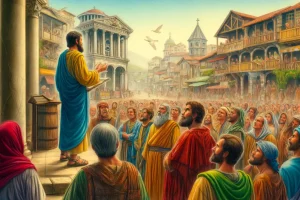
The Book of 1 Kings
The Book of 1 Kings is a key historical and theological document in the Hebrew Bible and the Christian Old Testament, chronicling the reign of Solomon and the subsequent division of the kingdom. Here are some concise key facts about 1 Kings:
- Title and Position: Named for the kings whose reigns it describes, 1 Kings is part of the “Former Prophets” in the Hebrew Bible and follows 2 Samuel in the Christian Old Testament.
- Authorship and Date: Traditionally attributed to the prophet Jeremiah, 1 Kings was likely composed during the Babylonian exile, around 561 to 538 BC.
- Structure and Content: The book can be divided into two main parts:
- The United Monarchy under Solomon (Chapters 1-11): Details Solomon’s accession to the throne, his wisdom, the building of the Temple in Jerusalem, his wealth and international relations, and his eventual downfall due to idolatry.
- The Divided Kingdom (Chapters 12-22): Chronicles the division of the kingdom into Israel (north) and Judah (south) following Solomon’s death, with the narrative focusing on various kings of both kingdoms and the prophetic ministries of Elijah and others.
- Main Themes:
- Wisdom and Folly: Solomon’s wisdom is a central theme, though it contrasts with his later foolishness in turning away from God.
- Divine Judgment and Mercy: The book explores the consequences of the kings’ actions, particularly how their obedience or disobedience to God impacts the nation.
- Prophetic Authority: The role of prophets like Elijah highlights the tension between divine authority and royal power.
- Theological Significance:
- 1 Kings reflects on the nature of God’s covenant with David, particularly how the sins of Solomon and subsequent rulers lead to the fracturing of the kingdom.
- The prophetic narratives stress God’s ongoing involvement in Israelite history, guiding, warning, and sometimes punishing His people through His prophets.
- Modern Relevance: 1 Kings offers insights into leadership, the peril of moral compromise, and the enduring importance of faithfulness to God’s commands.
The Book of 1 Kings is a crucial component of the Hebrew Bible and the Christian Old Testament, detailing the history of Israel from the final days of David’s reign through the rise and division of the kingdom under Solomon and his successors. This narrative provides a theological commentary on the leadership, decisions, and consequences that shaped the fate of Israel and Judah. Here is a detailed analysis of 1 Kings, exploring its structure, content, major themes, and theological implications.
Structure and Content
1. Solomon’s Reign (Chapters 1-11):
- Succession and Consolidation: Solomon’s ascent to the throne is not without contention but is ultimately solidified with the support of key figures like Nathan the prophet and Bathsheba. Solomon’s consolidation of power involves political maneuvering and establishing alliances.
- Wisdom and Prosperity: Solomon is famously granted wisdom by God, which he uses to govern Israel, adjudicate disputes, and engage in extensive building projects, including the construction of the Temple in Jerusalem, which becomes a central symbol of Israel’s religious life.
- International Relations and Apostasy: His reign also sees extensive international trade and political marriages, including his marriage to the daughter of the Egyptian Pharaoh. However, his alliances lead to idolatry, as his foreign wives bring their deities into Israel, leading to his spiritual downfall.
2. The Divided Kingdom (Chapters 12-22):
- Division and Political Turmoil: After Solomon’s death, the kingdom splits due to Rehoboam’s harsh policies, with ten tribes forming the northern kingdom of Israel under Jeroboam, and Judah (including Benjamin) remaining under Rehoboam.
- Jeroboam and Idolatry: Jeroboam establishes golden calves at Bethel and Dan to prevent his people from returning to Jerusalem for worship, setting a pattern of idolatry that plagues the northern kingdom.
- Prophetic Ministry: This period is marked by significant prophetic activity, notably by Elijah, who confronts the pervasive idolatry brought on by Ahab and Jezebel in the north. Elijah’s dramatic confrontations with the prophets of Baal and his miraculous experiences highlight the ongoing struggle between the worship of YHWH and Baal.
Major Themes
1. Leadership and Responsibility:
- The narrative explores the impact of leadership decisions on the nation. Solomon’s wisdom leads to prosperity, but his later choices bring division and decline. The subsequent kings are often evaluated based on their adherence to God’s law and their impact on the nation.
2. Covenant and Apostasy:
- 1 Kings repeatedly addresses the theme of covenant fidelity. The kings who follow God’s covenant bring blessings to their people, while those who lead the people into idolatry bring disaster and divine judgment.
3. Role of Prophecy:
- Prophets play a crucial role in guiding, correcting, and warning the kings and the people, serving as the mouthpieces of God. Elijah’s ministry, in particular, is pivotal in challenging the apostasy and injustice that characterized Ahab’s reign in Israel.
4. Divine Sovereignty and Human Agency:
- The book reflects on the tension between divine sovereignty and human action. While God remains in control and intervenes through prophets and judgments, human leaders significantly influence the direction of history through their choices.
Theological Significance
1 Kings is not just a historical account but a theological treatise that reflects on the nature of God’s relationship with Israel. It examines the consequences of idolatry and the importance of faithful worship. The division of the kingdom serves as a cautionary tale about the consequences of forsaking God’s covenant.
Conclusion
The Book of 1 Kings offers a profound reflection on the complexities of political and spiritual leadership within the framework of Israel’s history. It serves as a reminder of the importance of fidelity to God and the destructive consequences of turning away, themes that resonate through the ages and challenge contemporary readers to consider the implications of leadership and faithfulness in their own lives.
Tag:Ahab, Baal worship, biblical history, Book of 1 Kings, chariot of fire, civil strife, divided kingdom, divine judgment, downfall, Elijah, idolatry, Jeroboam, Jezebel, kingdom of Israel, kingdom of Judah, Mount Carmel, northern kingdom, Old Testament, political intrigue, prophetic ministry, Queen of Sheba, Rehoboam, royal lineage, Solomon, southern kingdom, succession, Temple in Jerusalem, wisdom



